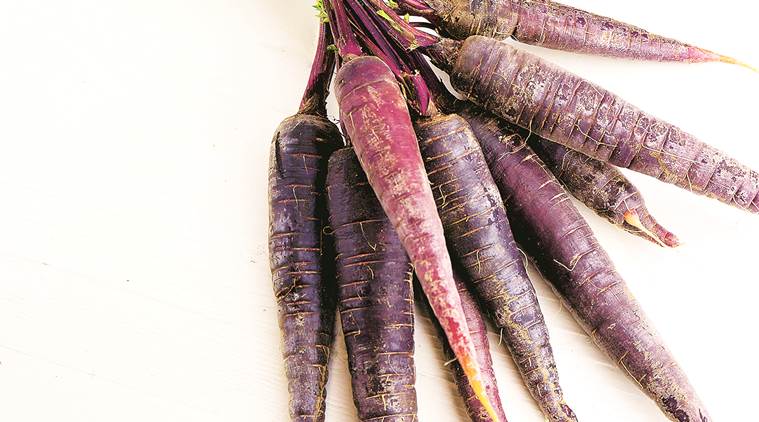 Food historians believe that the Hindu Kush region is where the dark carrots grew. (Source: Getty/Thinkstock)
Food historians believe that the Hindu Kush region is where the dark carrots grew. (Source: Getty/Thinkstock)
I rubbed my eyes, shook my head and coughed a bit, as if roused out of sleep. “Come on, finish the rest of it,” exhorted Beeji, our Punjabi neighbour, pointing to a glass with a dark purple concoction. Perhaps, in deference to her age, I sipped it up slowly. The drink seemed a little less sharp, and, in any case, did not lead to the paroxysms I had experienced after the first swig. “Now, that’s how you should be having kanji: in measured sips, that allows you to savour all its flavours. You should never gulp it down,” Beeji remarked in approval. “This drink will do you much good compared to those colas,” added her friend, my grandmother. I was too stunned to react.
A few weeks later, our neighbour rang the doorbell with another bottleful of kanji. I had not forgotten the last experience. Taking time between sips, I realised that Beeji had a point. The drink had a pungent kick all right. But it was also tart and mildly salty at the same time and seemed to have the zing I associated with fizzy drinks. Beeji was delighted when I told her that I really liked kanji. But after she left, I told grandma the colas were still better.
Perhaps, at some point, the two grannies decided that they needed to do something about my preference of beverages. The next winter, Beeji got large ceramic jars full of the concoction to our house to sun them in our terrace. Do not disturb the vessels, grandma said. And, as if to assuage my curiosity, told me that the vessels contained water, carrots, mustard seeds, and rock salt. “These aren’t the red carrots we usually eat,” she added. Some days later, she pointed to a vegetable vendor with a pushcart full of black carrots.
Food historians believe the Hindu Kush region to be the cradle of dark carrots. In his 2015 book, The Carrot Purple and Other Curious Stories of the Food We Eat, the American food historian Joel S Denker writes about an expedition of Russian agronomists who found a “variety of carrots — both wild and cultivated, and many a vivid purple — growing in Afghanistan in the 1920s. The domesticated carrot, they concluded, was first grown in the mountainous terrain, where the ridges of the Hindu Kush mountains met the Himalayas, in the 10th century AD.”
Farmers of this region, it is believed, were unhappy with the bitter-tasting, scrawny fork-rooted wild carrot. “Through a process of natural selection, they were able to cultivate a tastier vegetable with thicker and smoother roots that was also more easily harvested,” writes Denker. The historian quotes the 12th century Arab-Andalusian farm-manual writer, Ibn al-Awwam, as describing the dark carrot as an “immensely succulent” vegetable that “delights the heart”.
It’s perhaps such effervescence that draws microbes to the dark carrots in the barns of kanji makers. The skin is where all the goodness of the vegetable lies. The bacteria work on the sugars in the skin to create the drink brimming with probiotic virtues.
At times, Beeji would dunk in fried urad or moong dal dumplings in the carrot drink. Suffused with mustard, asafoetida and coriander, the vadas would imbibe the kanji’s goodness and delight the taste buds with a complexity of flavours. That, she said, made for an apt farewell to the winters — and prepare you for the summers.
Years later, a friend of Turkish ancestry told me of a similar joining of forces of carrots and microbes in the land of her forefathers in southern Turkey. A concoction of black carrots, turnips, salt, and cracked bulgur wheat, fermented for about two weeks in barrels, makes for the salgam suyu. Served cold in tall glasses, this tangy drink is known to pair well with the traditional Adana kebab. It’s also known to “settle the stomach” after a heavy meal, my friend would say.
The kanji, Beeji would say, is best had as an appetiser. You can also have it as a digestive. I prefer the fermented carrot drink anytime. And, yes, I agree with the grannies — it’s infinitely better than any cola.